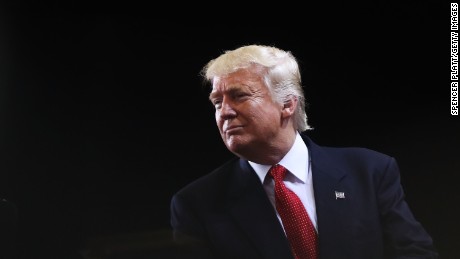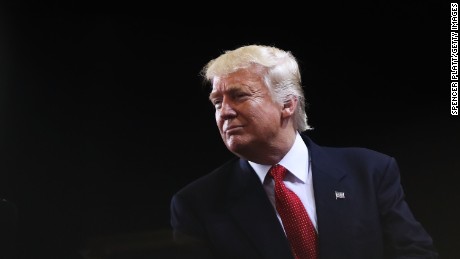What Trump tax report could mean for his campaign
Posted by John P. Bradford // October 3, 2016


Washington (CNN)Hillary Clinton’s campaign Saturday night seized on a New York Times report about Donald Trump’s 1995 tax records, in which the Times showed he declared a $916 million loss that could have allowed him to legally skip paying federal income taxes for years.
The revelations threatened to put the controversy over Trump’s refusal to follow recent precedent and release his tax returns at the center of the presidential campaign less than 40 days before the election, after a week in which the Republican nominee has struggled to bounce back from a debate in which most analysts and scientifically conducted polls scored Clinton as the winner.
His campaign vehemently pushed back on the Clinton campaign’s effort to turn the report into an “October surprise” moment, saying Trump has a “fiduciary responsibility” as a businessman to pay no more tax than legally required. It also charged that the report proved that the Times and the “establishment media” are merely an arm of the Clinton campaign.
The report contains some of the most detail of Trump’s financial empire that has been publicly reported. It was immediately picked up by Clinton’s campaign, which has sought to make Trump’s refusal to release his tax returns a major issue of the campaign.
Calling it a “bombshell report,” the Clinton campaign said the Times’ article “reveals the colossal nature of Donald Trump’s past business failures and just how long he may have avoided paying any federal income taxes whatsoever.”
The Times’ report shows Trump that year declared a $916 million loss and lists tax benefits he used after a turbulent financial period for him in the early 1990s. The paper, citing tax experts, said Trump could have used his loss to cancel out an equivalent amount of taxable income for nearly two decades.
The paper says it obtained the three pages of documents when they were mailed to a reporter last month. A postmark indicated the documents were mailed from New York City, and the return address claimed the envelope had been sent from Trump Tower.
The paper did not look at his federal return. It obtained one page of his New York State resident income tax return as well as the first page of New Jersey and Connecticut nonresident returns.
CNN has not independently verified the documents’ authenticity.
Trump himself responded via Twitter on Sunday morning, saying: “I know our complex tax laws better than anyone who has ever run for president and am the only one who can fix them. #failing@nytimes.”
“I have created tens of thousands of jobs and will bring back great American prosperity. Hillary has only created jobs at the FBI and DOJ!” he added.
In its statement issued Saturday night, the Trump campaign said the GOP nominee has paid hundreds of millions of dollars in other taxes, including property and real estate taxes.
“The only news here is that the more than 20-year-old alleged tax document was illegally obtained, a further demonstration that The New York Times, like establishment media in general, is an extension of the Clinton campaign, the Democratic Party and their global special interests,” the statement said.
The Trump campaign statement was notable because it did not directly deny the allegations in the Times report. It also noted that though Trump had paid some taxes, it did not specifically say he had paid income tax.
A central issue
Trump has maintained that his tax returns in recent years are under audit and that he has been advised by his lawyers that it would be unwise to release them while that process is going on. However, there is no legal reason why someone under audit cannot make their tax records public while they are running for office. Candidates for president have released their tax returns for decades.
Trump is also playing with fire in refusing to release his tax returns.
In the last presidential campaign in 2012, for example, Republican Mitt Romney’s resistance to releasing his tax returns was exploited by President Barack Obama’s re-election campaign.
Romney’s eventual decision to release tax returns also hurt him when it emerged that because most of his income as a former venture capitalist came from carried income and capital gains, he paid an effective tax rate of only around 14%. Although he was compliant with the law, it was easy for the Obama campaign to portray him as out of touch with the struggles of everyday Americans who have to pay higher tax rates on lower levels of income.
It would not be hard for the Clinton campaign — under pressure from Trump’s appeal in Rust Belt swing states left behind by globalization and a transforming economy — to make a similar argument.
Read more: http://www.cnn.com/2016/10/01/politics/donald-trump-taxes-report-hillary-clinton/index.html


